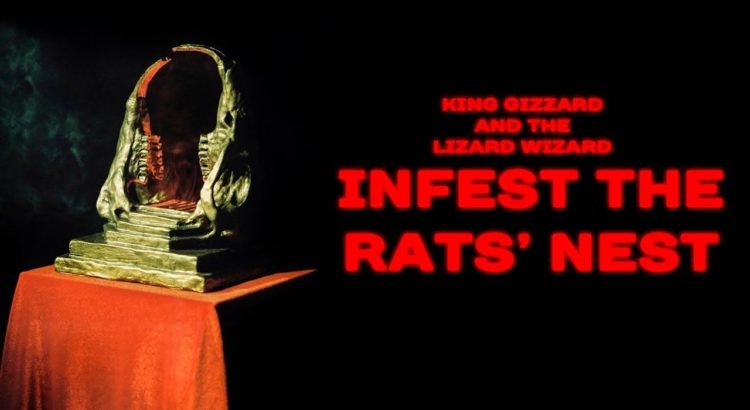One music genre that I struggle with is new rock and metal. There’s usually just too much noise and screaming and it gives me a headache, not to mention I have no idea what is going on lyrically or even musically half the time. On the other hand, I really WANT to enjoy heavy metal; the aesthetic is so raw and emotional, and great heavy metal music (think Iron Maiden) can be extremely motivational and profound. So I’ve spent a long time searching for new metal that I can actually enjoy, and that long and tedious journey finally led me to Infest the Rats’ Nest, a thrash metal album conceived by King Gizzard and the Lizard Wizard (don’t ask me about the name, I have no idea). Immediately this album set itself apart: it was clear and concise, with real musical composition that was understandable, it featured an environmental theme focusing on humanity’s destruction of the Earth, and although it was still more aggressive than I was used to at first, it was so catchy that I couldn’t stop listening, and it’s one of the most insanely energetic albums I have ever been able to listen to.
Surprisingly, King Gizzard and the Lizard Wizard usually produce psych rock and noise rock, which shares a lot of commonalities with thrash metal: it’s loud, over-the-top, energetic, and features a lot of interesting instrumentation. However, I can’t seem to enjoy any King Gizzard project as much as Infest the Rats’ Nest, and I think it’s because it’s the only album that strikes a great balance between the actual music and the content. This album in particular features a great concept that is executed flawlessly, unlike other albums that are all over the place, both in ideas and composition. The story of Infest the Rats’ Nest starts with a burned out planet Earth, largely destroyed by the unsustainable and destructive practices of the human race, portrayed best by these lines from the opening track Planet B:
Urbanization
Scarification
Population Exodus
There is no Planet B
Open your eyes and see
Not only do these lyrics hit close to home in the current day and age of environmental concern, they are so raw and accurate that it takes you by surprise. I never would have thought that thrash metal was the place to convey an environmental message, but listening to this song for the first time was mind-blowing: it makes perfect sense that the destruction of Earth, our home, should be portrayed with cynical clarity and thrashing aggression. These lines are especially powerful due to the perfect delivery by the lead singer and the accompanying gut-wrenching guitars and drums.
On the next track, Mars for the Rich, the perspective is that of a farmer left on a scorched Earth, poor and doomed to die a horrible death, while he watches the rich traveling to Mars on TV. The irony is strong after the haunting message of Planet B, and shows how although there is no planet B for the human race, there is for the rich and privileged.
Mars for the privileged
Earth for the poor
Mars terra-forming slowly
Earth has been deformed
The next track of interest is Superbug, which is exactly what it sounds like: a virus that is immune to antibiotics and ravages the Earth, infecting the population and lasting for generations. The concept of this song is best summed up by these lyrics:
Superbug gave a shrug
And ate all your prescription drugs
and never, ever, ever stopped
…
Unnecessary
Anti-Bs
Likely killed humanity
This track is almost prophetic given today’s situation, although it was bound to come true eventually given how accurate is and how careless humanity is with antibiotics, especially in relation to factory farming. One thing I love about this song is how gritty and terrifying it is; the Superbug is portrayed as indiscriminate and inevitable, while the narrator anguishes about the Superbug in his blood, knowing that he is doomed and so is the rest of humanity. Again, I think this song really emphasizes how perfectly thrash metal and environmental consciousness complement each other, using grim lyrics and devastating instrumentation to convey the looming destruction of the Earth.
The second half of the album is just as interesting, if not more sci-fi oriented, and continues on the environmental themes of the first half. I would love to discuss it more but unfortunately this post is already quite long; therefore I recommend giving it a listen yourself. Pay attention to the message of each song and how they all connect, while also noticing how well the music complements the message, then feel free to leave a comment and we can discuss it further. Regardless, Infest the Rats’ Nest is a stand out metal album, the only one of its kind, due to both the quality of the composition and the effective presentation of its unique environmental message.



Leave a Reply
Be the First to Comment!